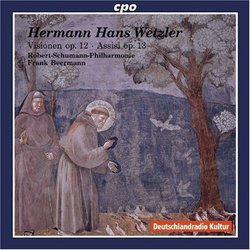| All Artists: Wetzler, Robert-Schumann Philharmonie, Beermann Title: Hermann Hans Wetzler: Visionen Op. 12; Assisi Op. 13 Members Wishing: 0 Total Copies: 0 Label: Cpo Records Original Release Date: 1/1/2009 Re-Release Date: 10/27/2009 Genre: Classical Style: Symphonies Number of Discs: 1 SwapaCD Credits: 1 UPCs: 761203741229, 761203741229 |
Search - Wetzler, Robert-Schumann Philharmonie, Beermann :: Hermann Hans Wetzler: Visionen Op. 12; Assisi Op. 13
 | Wetzler, Robert-Schumann Philharmonie, Beermann Hermann Hans Wetzler: Visionen Op. 12; Assisi Op. 13 Genre: Classical |
Larger Image |
CD Details |
CD ReviewsGerman composer in the U.S. Craig M. Zeichner | Brooklyn, NY | 01/26/2010 (4 out of 5 stars) "You have to tip your hat to the A&R folks at the quirky CPO label. Each month they manage to come up with little-known works by mostly little-known composers. Visionen and Assisi, two large-scale orchestral works by Hermann Hans Wetzler (1870-1943) are the centerpieces of a new recording by the Robert Schumann Philharmonia under the direction of Frank Beermann.
Who is Wetzler you might ask? Born in Frankfurt am Main, Wetzler grew up in Chicago and Cincinnati. In 1885 Wetzler and family moved back to Germany and Hermann studied at the Hoch Conservatory under the gaze of Clara Schumann. He eventually moved to New York where he worked as an organist, violist, choir director and piano teacher. In 1902 he established his own orchestra and concert series. Wetzler's music was cast in the big post-Romantic style and was strongly influenced by Richard Strauss. If you like Mahler and Strauss you will probably like Wetzler's music. The Visonen are grandly scaled tone poems which, according to the liner notes, "capture in musical form visions of the human spirit." There's lots of fire and bluster in the work and Wetzler skillfully sets a dramatic mood in each movement. Fans of Mahler will be particularly drawn to the Intermezzo ironico movement, a grotesque dance that conjures up memories of many a Mahler scherzo. Assisi is also quite a strong; it's an epic six-movement work with echoes of early Schoenberg in the Einsamkeit (Solitude) movement and Strauss in the final Bruder Tod (Brother Death) section. The Robert Schumann Philharmonia isn't the Berlin Philharmonic but they are a competent ensemble just the same. Their conductor Frank Beermann excels in leading the orchestra in recordings of many of these B minus level composers, so there is no reason not to give this a listen. " |
